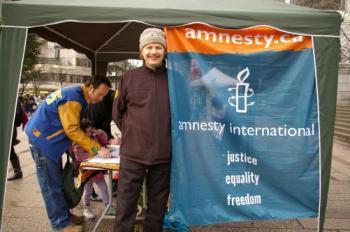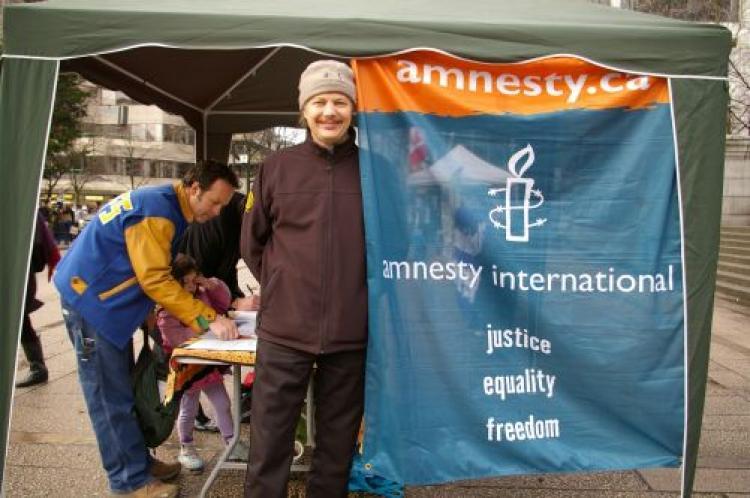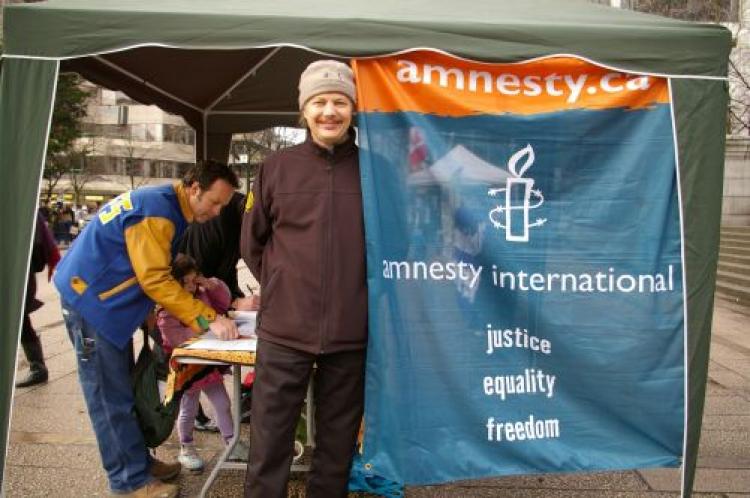The UDHR holds special significance for Canadians since its first draft was authored by McGill University law professor John Peters Humphrey.
Adopted in 1948 by the United Nations General Assembly at the Palais de Chaillot in Paris following the horrors of World War II, the UDHR established 30 inalienable rights that every human being should be guaranteed.
The declaration was the first global recognition of universal human rights and has formed the basis for many human rights instruments that followed. Available in more than 360 languages, it is the most translated document in the world.
However, for many around the world, inalienable human rights are far from being a reality. This was apparent in activities across the country on Wednesday, with human rights advocates taking the opportunity to raise awareness of various ongoing rights abuses in many countries.
In Toronto, Tibetans and their supporters observed the anniversary by “freezing in place” at major Toronto landmarks while holding Tibetan flags. This was followed by a candle-light vigil and a documentary screening in the evening.
In Vancouver, the Canada Tibet Committee (CTC), Falun Gong and Amnesty International Vancouver gathered for a rally outside the Vancouver Art Gallery where they provided petitions and displayed banners highlighting their various causes.
Globally, Tibetans and their supporters are calling for the immediate release of Tibetan political prisoners including 81 year-old Paljor Norbu, a publisher of Buddhist monastic texts recently sentenced to seven years in prison, and Dhondup Wangchen, a prominent Tibetan filmmaker detained in March.
“Tibetans in Tibet have basically been denied all basic rights for the last 60 years,” said said CTC president Tenzin Lhalungpa.
Amnesty International Vancouver focused on human rights abuses in Burma, Tibet, Ethiopia and China, while the Falun Gong raised awareness about the persecution of adherents at the hands of the Chinese regime.
According to Sue Zhang, spokesperson of the Falun Dafa Association of Vancouver, there have been more than 3200 Falun Gong practitioners persecuted to death under the Chinese Communist Party (CCP) since 1999. That’s the official number. Zhang believes the real number is much higher.
“We hope everyone can learn about the serious abuse of human rights of Falun Gong practitioners. Although China is an original signatory to the UN Declaration of Human Rights, the CCP has not carried out the duties and responsibilities outlined in the declaration,” said Zhang.
Amnesty International’s national office in Ottawa welcomed supporters to its annual letter-writing event in support of human rights.
“What inspires me is that today is International Human Rights Day and I know that similar events are taking place across the country and around the world,” said “Write for Rights” volunteer Kelsey Wagner. “Letter writing really does work. It has put enough pressure on governments in some cases to release political prisoners and to stop abuses.”
“People wonder what they can do. This event really make it concrete for people when you look at the range of actions people can take, including solidarity actions with organizations and individuals in detention,” said Hilary Homes, International Justice, Security, and Human Rights Campaign Coordinator at Amnesty.
“It puts direct pressure on the governments and agencies that are perpetrators of violations but also those who have the power to create change. . . . because silence means a great deal as well. We need to be conscious of what it means to not act.”
Members of the public can also visit Amnesty’s write-a-thon website at www.amnesty.ca/writeathon to get information about cases, sign on-line petitions, and write letters from their homes to the governments and people involved, said Mr. Wagner.
Also on Wednesday, Rights and Democracy awarded the 2008 John Humphrey Freedom Award to Zimbabwe Lawyers for Human Rights (ZLHR), a leading human rights promoter and defender in Zimbabwe.
Rights and Democracy president Rémy Beauregard presented the award to ZLHR Executive Director Irene Petras and fellow lawyer Andrew Makoni at a ceremony at the Canadian Museum of Civilization in Gatineau/Ottawa.
The theme of this year’s International Human Rights Day is “Dignity and justice for all of us.”






